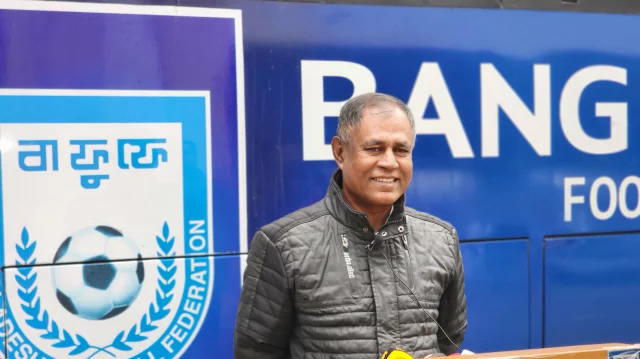Golam Robbani Choton, the long-serving figure in Bangladesh’s youth football development, is facing growing criticism from fans, analysts, and even sections of the football community following Bangladesh U-19’s disappointing SAFF Championship campaign. Despite a talented squad at his disposal, Choton’s rigid tactical approach, questionable team selections, and contradictory statements have left many wondering whether Bangladesh fell short not because of player limitations — but because of coaching mismanagement.
The controversy began with Choton’s insistence during the tournament that, “to me all the players are the same, it doesn’t matter if he is an origin player or local player.” However, his decisions on the pitch told a different story. Two of the most highly regarded origin players — Farzad and Abdul Kadir — were barely seen. Farzad, despite strong performances in training and friendlies, didn’t play a single minute in the tournament. Abdul Kadir, a natural winger with proven attacking instincts, was deployed out of position as a holding midfielder for just 25 minutes — a decision that puzzled many observers.
In contrast, local players like Rifat Kazi and Soren were repeatedly picked and kept on the pitch, even as their performances were marred by costly errors. Choton’s unwavering trust in underperforming players, combined with his reluctance to rotate or adapt, led to mounting frustration from fans.
When asked after the final about his loud pitchside instructions to play the ball to Mursed Ali — who, despite flashes of individual brilliance, was often isolated and overburdened — Choton claimed it was “part of his tactical plan.” Yet, many believe this pointed more to desperation than design. Throughout the tournament, Bangladesh lacked alternative strategies, with no visible plan B when the primary setup faltered. Substitutions were either too late or poorly judged, adding to the sense that the team was running on autopilot rather than adapting to the evolving demands of each match.
Netizens have not held back. Social media platforms have been abuzz with commentary slamming the tactical naïveté, missed opportunities, and perceived favouritism. “If we had proper coaching, we would have won the SAFF U-19 Championship,” read one widely shared post on X (formerly Twitter). Many echoed that sentiment, suggesting the team’s talent was not matched by the coaching staff’s tactical awareness or flexibility.
Choton, known for his past contributions to women’s football and youth development, now finds himself in the eye of the storm — not merely for losing a trophy, but for appearing to avoid accountability. His current attempts to portray a picture of fairness and tactical intent are being interpreted by critics as attempts to deflect from what was, in the eyes of many, a stubborn and flawed tournament campaign.
With Bangladesh’s youth system striving to evolve, serious questions must now be asked about whether Choton remains the right man to lead the next generation of talent. Football, especially at the developmental level, demands more than familiar faces — it requires courage, adaptability, and above all, fairness. And on all three fronts, Choton appears to have fallen short.


